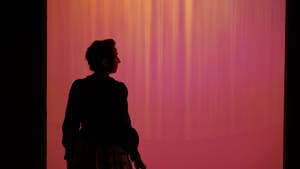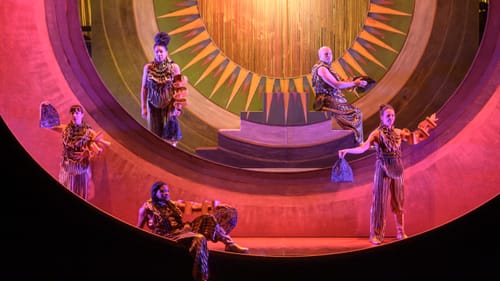Stay in the Loop
BSR publishes on a weekly schedule, with an email newsletter every Wednesday and Thursday morning. There’s no paywall, and subscribing is always free.
A new opera about the artist Hilma af Klint fails to illuminate her
The Wilma Theater and New Georges present Kate Scelsa and Robert M. Johanson’s Hilma

If the name Hilma af Klint means nothing to you, don’t expect to be enlightened by Hilma, the so-called “contemporary opera” that opened recently at the Wilma Theater. You may find yourself spending intermission scouring the depths of Wikipedia for context, as I observed several audience members doing at the performance I attended.
The historical Hilma (1862-1944) was a Swedish painter, mystic, and proponent of the theosophical movement. She cultivated her own air of mystery by retreating from society and dictating that her works remain unseen until 20 years after her death. A 2018 exhibit at the Guggenheim revived interest in her art, serving as partial inspiration for composer Robert M. Johanson and librettist Kate Scelsa.
Theatrical narratives of real people need not slavishly limit themselves to just the facts. (Cole Escola’s brilliant Oh Mary!, a queer fantasia on Mary Todd Lincoln that transfers to Broadway later this month, proves this point splendidly.) Yet Hilma more often obscures than illuminates the life and legacy of a figure that the creators so clearly revere. It wallows in clichés of avant-garde theater that leave the subject, and the project, looking silly and shallow—exactly what you want to avoid when introducing the public to an unjustly neglected figure from history.
Creation, astral plane, and talkback
Scelsa and Johanson structure the work across three acts. The first centers on the creation, between 1896 and 1912, of a series of canvases meant to adorn a theosophical temple. Hilma (Kristen Sieh) receives revelations from a spiritual master, Amaliel (Evan Spigelman), and seeks the approval of Rudolf Steiner (played by Johanson), a leading thinker in the movement. He coldly rejects her efforts, leading her to leave Stockholm with her lover, Anna (J Molière).
The confrontation between Hilma and Steiner lacks the stakes it should have, largely because the viewer isn’t made to fully understand the immense fruits of Hilma’s labor. Rather than show the artwork itself—glimpses of it are shrouded behind the large wall of Krit Robinson’s set—or have Hilma give voice to it in song, the majority of the first act is taken up with Hilma’s social set bickering over what they should and shouldn’t be doing. (In addition to Spigelman and Molière, the ensemble also includes Sarah Gliko and Brett Ashley Robinson). When Steiner dismisses Hilma, we can hardly sense what has been momentarily lost to history. It doesn’t help that Johanson—whose voice somehow manages to sound parched and wobbly at the same time—plays the role as a one-dimensional, mustache-twirling villain.
The second act moves to the “Astral Plane,” which here resembles the set of a tacky 1970s variety show. No longer, it appears, playing characters, the five principal performers now appear as a general ensemble, wearing hideous fluorescent spacesuits (designed by Maiko Matsushima) and singing incomprehensible, faux-spiritual lyrics. Think ABBA with a New Age twist. The final act—pretentiously subtitled “Here, tonight”—takes the form of a theatrical talkback, and somehow manages to be even more insufferable than the real thing often is. The archness of the actors, now dressed in street clothes, playing heightened versions of themselves and singing answers to imaginary questions is nearly unbearable.
Hilma as afterthought
Lots of topics are addressed in that final sequence: what the viewer brings to art, what artists owe their audience (if anything), how queer perspectives have been suppressed throughout history, and the ways in which women subconsciously subjugate themselves for the sake of society. What remains unclear is Hilma’s place in these discussions. Throughout the work itself, the main subject regularly seems like an afterthought.

Part of the blame here lies with Sieh’s bland performance. Although she sings well, she doesn’t capture the mystical drive or charisma that caused Hilma’s circle to view her as the natural face of their movement. (The overall production, directed by Morgan Green, struggles to foreground the importance of any individual character to the drama.) But more to the point, Scelsa and Johanson don’t seem sure which story they want to tell. Is this a portrait of an artist as a neglected genius, or a treatise on how artistic viewpoints evolve and shift over time? In the end, Hilma grasps at both and achieves neither.
Not ready for larger stages
Although the definition of opera has grown porous, the only sense of why that moniker has been affixed here seems to be that it is mostly sung through. At its core, opera celebrates the communion of the human voice and the musical instrument in their purest forms, yet here, both singers and band are so mercilessly overamplified that you struggle to discern a single phrase. (The sound design is by Chris Sannino.) Johanson doesn’t supply a single compelling vocal line, and the score largely sounds bland and generic, thrumming along like the factory settings on a Casio keyboard. An opera about mysticism could use polyphony, incantation, or chanting in intriguing dramaturgical ways, but the music is largely devoid of them here. Scelsa’s libretto captures neither a sense of poetry nor an understanding of actual speech patterns.
Hilma is a co-production of the New York-based theater company New Georges, which suggests the desire for a longer life following this Philadelphia premiere. As it stands, the work is not ready for larger stages. For the Wilma, it is merely a blip on what has been an otherwise extremely strong season, which will culminate in the company receiving the 2024 Regional Theatre Tony Award later this month.
A streaming version of Hilma ($29) will be available from June 24 through July 21, 2024.
What, When, Where
Hilma. By Kate Scelsa and Robert M. Johanson, directed by Morgan Green. $29-$80. Co-production of Wilma Theater and New Georges. Through June 23, 2024, at the Wilma Theater, 265 S Broad Street, Philadelphia. (215) 546-7824 or wilmatheater.org.
Accessibility
The Wilma Theater is a wheelchair-accessible space with all-gender restrooms.
Sign up for our newsletter
All of the week's new articles, all in one place. Sign up for the free weekly BSR newsletters, and don't miss a conversation.

 Cameron Kelsall
Cameron Kelsall